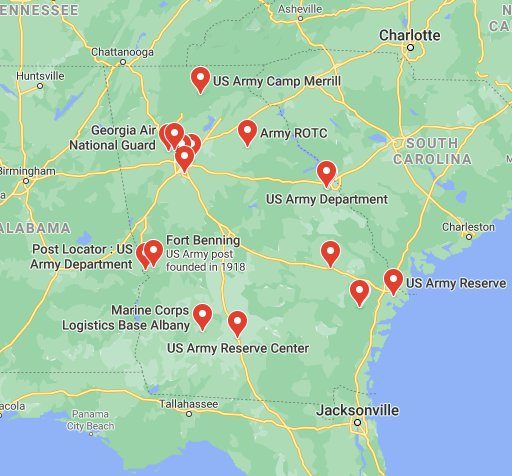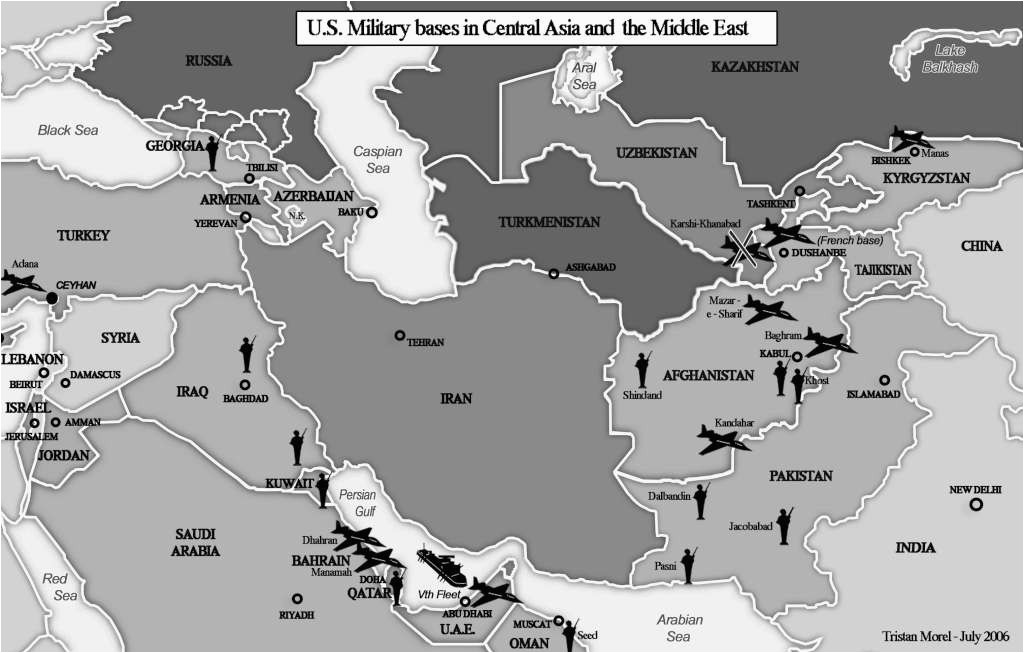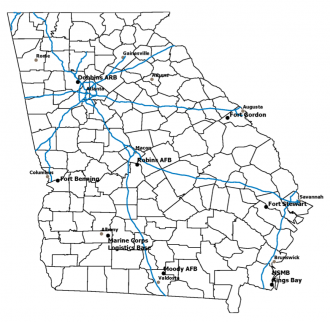A Comprehensive Guide to Georgia’s Military Presence: Understanding the State’s Strategic Importance
Related Articles: A Comprehensive Guide to Georgia’s Military Presence: Understanding the State’s Strategic Importance
Introduction
With enthusiasm, let’s navigate through the intriguing topic related to A Comprehensive Guide to Georgia’s Military Presence: Understanding the State’s Strategic Importance. Let’s weave interesting information and offer fresh perspectives to the readers.
Table of Content
- 1 Related Articles: A Comprehensive Guide to Georgia’s Military Presence: Understanding the State’s Strategic Importance
- 2 Introduction
- 3 A Comprehensive Guide to Georgia’s Military Presence: Understanding the State’s Strategic Importance
- 3.1 Understanding the Strategic Significance of Georgia’s Military Bases
- 3.2 A Detailed Look at Georgia’s Military Bases
- 3.3 Understanding the Impact of Georgia’s Military Presence
- 3.4 Addressing Concerns and Challenges
- 3.5 FAQs about Georgia’s Military Bases
- 3.6 Tips for Visiting Georgia’s Military Bases
- 3.7 Conclusion
- 4 Closure
A Comprehensive Guide to Georgia’s Military Presence: Understanding the State’s Strategic Importance

Georgia, a state steeped in history and known for its diverse landscape, also plays a crucial role in the nation’s defense strategy. The state boasts a significant military presence, housing numerous bases and installations that contribute to national security and economic prosperity. This comprehensive guide delves into the intricate network of Georgia’s military bases, examining their significance, impact, and future prospects.
Understanding the Strategic Significance of Georgia’s Military Bases
Georgia’s strategic location at the crossroads of the Southeast and the Atlantic Coast, combined with its robust infrastructure and skilled workforce, has made it an attractive location for military installations. These bases serve a multitude of purposes, including:
- National Defense: Georgia’s military installations contribute directly to the nation’s defense posture, providing a critical presence in the Southeast region and beyond. They house various branches of the armed forces, including the Army, Navy, Air Force, and Coast Guard, each with specialized roles and responsibilities.
- Training and Readiness: The state’s bases serve as vital training grounds for military personnel, ensuring they are prepared for a wide range of operational scenarios. Advanced training facilities, coupled with access to diverse terrain and airspace, contribute to the readiness and effectiveness of the U.S. military.
- Economic Impact: Military bases inject significant economic activity into the surrounding communities, creating jobs, boosting local economies, and fostering business growth. Their presence attracts related industries, contributing to a vibrant and diversified economic landscape.
- International Cooperation: Georgia’s military bases serve as hubs for international cooperation and collaboration. They host foreign military personnel and facilitate joint training exercises, strengthening alliances and promoting regional stability.
A Detailed Look at Georgia’s Military Bases
Georgia’s military landscape is characterized by a diverse array of installations, each playing a unique role in the overall defense strategy. Here’s a closer look at some of the key bases:
Fort Stewart: Located in the southeastern part of the state, Fort Stewart is home to the 3rd Infantry Division, known as the "Rock of the Marne." This division is a highly mobile and versatile force, prepared for rapid deployment anywhere in the world. The base also houses the 1st Armored Brigade Combat Team, contributing to the Army’s armored capabilities.
Fort Benning: Situated in the southwestern region, Fort Benning is the U.S. Army’s premier training center for infantry and armor. It is renowned for its rigorous training programs, including the Infantry Basic Officer Leader Course and the Airborne School. The base also houses the Maneuver Center of Excellence, responsible for developing and implementing Army doctrine for maneuver warfare.
Moody Air Force Base: Located in the southern part of the state, Moody Air Force Base is home to the 23rd Wing, operating the A-10 Thunderbolt II, a close air support aircraft. The base also supports the Air Force’s Special Operations Command, contributing to the nation’s counter-terrorism efforts.
Hunter Army Airfield: Located near Savannah, Hunter Army Airfield serves as a critical aviation hub for the Army’s 3rd Infantry Division. It supports a wide range of aircraft, including helicopters, fixed-wing aircraft, and unmanned aerial vehicles.
Naval Submarine Base Kings Bay: Located on the coast, Kings Bay is home to the U.S. Navy’s Atlantic Fleet Submarine Force. It houses a significant portion of the nation’s nuclear-powered ballistic missile submarines, playing a crucial role in the nation’s strategic deterrent.
Dobbins Air Reserve Base: Located near Atlanta, Dobbins Air Reserve Base serves as a vital training and deployment hub for the Air Force Reserve. It supports a variety of units, including the 94th Airlift Wing, which operates the C-130 Hercules, a versatile transport aircraft.
Marine Corps Logistics Base Albany: Located in the southwest, Albany serves as a vital logistics hub for the Marine Corps. It provides warehousing, distribution, and repair services for various military equipment and supplies.
Fort Gordon: Located in Augusta, Fort Gordon is the home of the U.S. Army Cyber Command and the Signal Corps. It plays a crucial role in the nation’s cyber defense and communication capabilities.
Other Significant Installations: Georgia also houses several smaller military installations, including the Naval Air Station Jacksonville (which also serves Florida), the Coast Guard Station Savannah, and various Army National Guard and Air National Guard facilities.
Understanding the Impact of Georgia’s Military Presence
Georgia’s military bases have a profound impact on the state’s economy, culture, and overall well-being. The bases contribute significantly to:
- Economic Growth: Military installations inject billions of dollars into the state’s economy each year, creating thousands of jobs and supporting local businesses. They attract related industries, such as defense contractors, aerospace companies, and logistics providers, contributing to a diversified economic landscape.
- Community Development: The presence of military bases often leads to infrastructure improvements, enhanced public services, and increased community engagement. The bases also support local schools, hospitals, and other community institutions, contributing to the overall well-being of the surrounding areas.
- Cultural Enrichment: Military installations bring a unique cultural dimension to the state, fostering a strong sense of patriotism and community. They provide opportunities for interaction with military personnel and their families, enriching the cultural tapestry of Georgia.
Addressing Concerns and Challenges
While Georgia’s military presence brings numerous benefits, it also presents certain challenges that require careful consideration and management:
- Environmental Impact: Military activities can have an impact on the environment, including noise pollution, air pollution, and potential contamination. It is crucial to implement responsible environmental practices and mitigate any negative impacts.
- Community Relations: The presence of large military installations can sometimes lead to tensions with surrounding communities, particularly regarding issues like noise, traffic, and development. Open communication and collaboration are essential to foster positive relationships.
- Economic Dependence: While the military presence creates economic opportunities, it can also lead to a degree of economic dependence. It is important to diversify the state’s economy and reduce reliance on military spending.
FAQs about Georgia’s Military Bases
Q: What are the main branches of the military represented in Georgia?
A: Georgia is home to installations representing all branches of the U.S. military: the Army, Navy, Air Force, Marine Corps, and Coast Guard.
Q: What are the largest military bases in Georgia?
A: The largest military bases in Georgia are Fort Stewart, Fort Benning, and Moody Air Force Base.
Q: What are the primary missions of Georgia’s military bases?
A: Georgia’s military bases serve a variety of missions, including training, readiness, national defense, international cooperation, and logistics.
Q: How do military bases impact the state’s economy?
A: Military bases inject billions of dollars into the state’s economy each year, creating thousands of jobs and supporting local businesses.
Q: What are some of the challenges associated with military bases in Georgia?
A: Challenges include environmental impact, community relations, and economic dependence.
Tips for Visiting Georgia’s Military Bases
- Plan ahead: Check the base’s website for visitor guidelines, hours of operation, and any required security measures.
- Respect the environment: Be mindful of noise levels and avoid disturbing wildlife.
- Be respectful of personnel: Remember that military bases are operational facilities and follow all instructions from base personnel.
- Learn about the history: Many bases have museums or historical exhibits showcasing their past and present roles.
Conclusion
Georgia’s military bases play a vital role in national security, economic prosperity, and community well-being. They provide essential training, readiness, and operational capabilities, while also contributing to the state’s economic growth and cultural diversity. Understanding the strategic importance of these installations and addressing associated challenges is crucial for ensuring their continued success and contribution to the state’s future.







Closure
Thus, we hope this article has provided valuable insights into A Comprehensive Guide to Georgia’s Military Presence: Understanding the State’s Strategic Importance. We appreciate your attention to our article. See you in our next article!